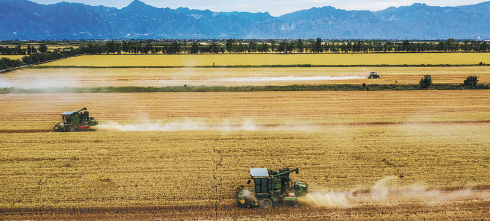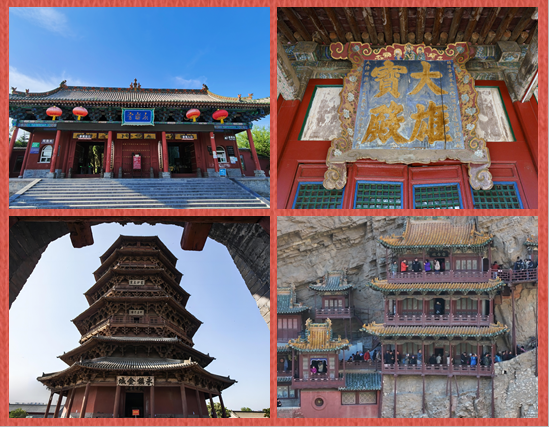Ruicheng to boost its harvest output with irrigation system
Updated: 2021-06-18

Farmers use machines to harvest wheat in the township of Donglu in Ruicheng county. [Photo by Gao Zhiyong for China Daily]
Modern operations to increase efficiency and allow local residents to earn higher incomes
When the harvest of wheat was about to begin in Ruicheng, the county in Yuncheng city in Shanxi province held a grand gala to witness what appears to be a certain good harvest.
Wheat growers, experts and officials gathered in the county for the 2021 Yuncheng Wheat Culture Festival on June 8.
Sun Zhonghua, chairman of the China Society of Cooperative Economics and former chief agronomist at the Ministry of Agriculture and Rural Affairs, said the festival is expected to become a brilliant branding campaign for the marketing of local grain and promoting Yuncheng's unique farming culture.
Accounting for more than a half of wheat output in the province, Yuncheng is known as "the granary of Shanxi".
Ruicheng is the leading wheat growing area in Yuncheng. It has been rated as one of China's top grain-producing counties for 11 consecutive years.
While experts and officials are optimistic about the wheat output this year, Li Zhanpeng, a farmer in the village of Caicun, said he has even higher expectations.
Li's family operates a half hectare of wheat land, with about a half of the land having access to an irrigation system and the other half being terraced fields.
"The output from the irrigated land is about 7.5 metric tons a hectare in normal years, while that of the terraced fields is less than 2.5 tons," Li said.
But his terraced fields will have access to irrigation this year, thanks to a new irrigation project recently launched by the county, Li said. "With adequate water supply, there will be a threefold increase in output from my former dry, terraced fields."
Yang Zeqi, an official at the Ruicheng bureau of agriculture and rural affairs, said the new irrigation system in Caicun will cover a wheat growing area of more than 60 hectares this year.
"The farmlands on the terraces by the Yellow River feature sufficient sunlight and good soil quality," Yang said. "A lack of an irrigation system, however, is the major bottleneck hindering output increase."
The official said the new project is not just limited to irrigation.
"Facilities will be built for the operation of farming machines and the irrigation system can be used for both watering and fertilizing," Yang said.
In Caicun, about 200 households that farm on terraced fields will benefit from the project, according to Li Zuomin, an official of the village.
"Farmers used to harvest their crops once a year," the village official said. "With this irrigation system in place, they can do so twice a year, which means another dramatic increase in output."
Ren He, Party secretary of the county's bureau of agriculture and rural affairs, made an accurate estimation of crop output increase as a result of the current farmland improving program.
"In Ruicheng, we now have more than 22,700 hectares of high-standard farmlands with access to irrigation and facilities for machined operations.
"The farmland-improving program will cover another 2,500 hectares this year and about 20,000 hectares by the end of 2025. The total area of high-standard farmlands will surpass 45,000 hectares."
Ren estimated the grain output in Ruicheng will double its current figure to reach 360,300 tons in 2025.
In addition to improving farmland conditions, the county's agricultural authorities are helping farmers increase output and improve product quality with modern farming measures, Ren said.
These efforts include on-site instructions by local agronomists, promotion of farming machines, the use of organic fertilizers and the use of the internet of things for monitoring farmland conditions.
Chen Zuankang, a farmer in Yaotou village, is a beneficiary of modern farming operations.
"In the past, we used a lot of fertilizers in farming-about 1,000 kilograms a hectare," Chen said. "That cost nearly 2,000 yuan ($312) a hectare."
The farmer said the use of organic fertilizers can help cut costs by more than 800 yuan a hectare.
"Organic fertilizers can substantially improve soil conditions-preventing it from hardening and increasing nutrition," Chen added.
Also helping to improve farming efficiency are various machines. Such machines are mostly owned by local cooperatives.
Dongheng Farming Machines Cooperative based in the county seat of Ruicheng is one such entity.
Currently owning 56 different sets of machines, the cooperative was founded in 2010. It now has more than 200 member households, according to Zhang Dongdong, chief of the cooperative.
"In Ruicheng, most of the farmers operate small pieces of land," Zhang said. "It is impossible for them to own a variety of farming machines individually."
He noted that the farming cooperatives now offer "a perfect solution" to the problem.
Zhang said Dongheng not only operates farming machines, but also offers a full range of services for farmers, from tilling to harvesting and even grain storage and sales.
Yin Yaozong from Wanli village is a member of the cooperative. He said his family operates a farm of nearly seven hectares.
"Farming on the plantation used to require the labor of an entire family," the 66-year-old said. "And we had to hire farming workers in the busiest time."
But now he can take care of the farm on his own while other members of his family find other jobs to increase revenues, Yin said.
Guo Yanjie contributed to this story.



